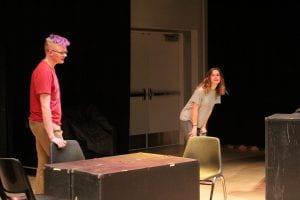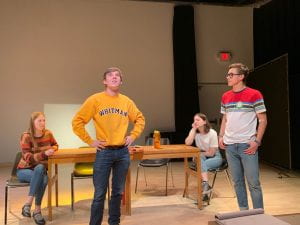The Spring 2020 season at the Harper Joy Theatre is being kicked off with the annual One Acts Play Festivals. Students are given the chance to submit original scripts, three of which are selected by a committee to be produced. The directors, cast, and crew are also made up entirely of students and the audience are invited to participate by voting on which play places first, second, and third.
This year the selected plays are Break by Annabelle Hannan (Class of 2021), Stray by Oriana Golden (Class of 2021), and The God Auditions by Rachael Goldsmith Zucker (Class of 2022). Golden is also the director of The God Auditions. I had the chance to sit down with all three writers and get an inside look into their creative process and hear a little bit more about the casting and production stages of the festival.
Melina Waldman: What was the inspiration behind the play you wrote?
Annabelle Hannan: I thought it would be funny if an advertising campaign that became really iconic was thought of by accident… and it’s a semi-true story, a couple of the characters are the real advertisers who thought of the slogan, but the other three are totally made up. I just put them all in that time-crunch situation where they’ve got a few minutes to think of an iconic campaign.
Oriana Golden: I spent my past semester studying off campus at the National Theatre Institute. One of the things we did there was playwriting and one of our assignments was to write a play in the style of American Realism. The rules of American Realism are that it has to have a family as the centerpiece of the story, and it has to take place in a house, usually a kitchen, and then there has to be a secret that’s revealed later on. So I kind of started off with the most basic, stereotypical nuclear family and then unveiled a twisted ending.
Rachael Goldsmith Zucker: I thought of it over the summer. It just sort of popped into my head, like auditioning for god, what that would mean. And I think there are so many images that come to mind, like charged images about god, specifically white and male, and I was just really interested in the topic of what the challenge would look like.
MW: How well would you say the version that’s in production aligns with the vision you had for the play when you were writing it?
AH: I actually haven’t seen the show at all since the first read through. I got to be there for auditions and I got to know who the cast was before the cast list went out, but I told Sofia [Solares], the director, that I’d like to come back when they’re off book… My show is a very character driven show, so I hope the actors are having fun figuring out how to play those characters.
OG: I haven’t seen a lot of what’s going on and rehearsals just started not too long ago, so I’m not entirely sure but I saw the auditions and the people who auditioned were wonderful, and the people who are cast are wonderful, as are the stage managers and the director.
RGZ: Very well in terms of how it’s being done. We didn’t have any actual trans women of color audition, which is what the part was originally written as but I think the intention with the work… didn’t necessarily have to be that identity but rather just challenging the idea of a white male god… I am definitely worried about portraying it as too stereotypical because obviously I’m not the best person to be writing this story as a cis white woman, but I felt like it was an important enough story that I wanted to try. In the version that’s being done now, I had to rewrite the script for a white trans man and I think it works just as well in the context that I’m going for.
MW: I would love to hear a little more about your writing process. Are there any specific challenges you faced? A favorite part?
AH: The end was actually the first thing that I had thought of for the show, so when I sat down to write it… I was like, ‘okay, now I just need a beginning and a middle’. The beginning was easy but it had to be stretched out a little bit longer from my very first draft because it wasn’t very long… I had a lot of fun looking up things from the eighties, like advertising campaigns that were already out… and slipping in more jokes.
OG: This is the first play I’ve ever written. It was kind of a challenge just figuring out how to write I guess, just developing the story and making the dialogue sound natural was a challenge.
RGZ: I was in a playwriting class this last semester and it was an inspiration. It was really helpful to have people give me feedback, so I had several drafts and people gave me several ideas… like [the fact] that no one else showed up to audition. It’s nice getting different perspectives. I think in my first draft there weren’t as many moments of levity, and it was more serious and just very technical and thought oriented. So, it was fun finding out how to translate that to theatricality.
MW: What is your level of involvement with the casting and production of the play?
AH: I chose not to have high involvement in the casting process because the writers get to decide how much they want to talk in those sorts of situations. I loved being there for it and seeing the ways people took the characters and I did express some opinions, but I wanted to hand the reins over to Sofia and Julia [Etrusco], who’s the stage manager, and let them have most of the say in it because I wrote the play and they can do with it what they want.
OG: I sat in on the conversation with the director and the stage managers and provided my feedback, but I wanted to leave the casting up to them because it’s the directors job to cast it. I am directing another one, so I cast that show and that was fun. We had a lot of great people audition for that one too, so it was just a fun time to get to see everyone act and see everyone’s different interpretations of the parts.
RGZ: Pretty involved. I didn’t have the final say in who was cast but because it’s such a difficult play to cast, the director chose to involve me quite a bit, especially because I had to rewrite so much of it and she really made sure that my intentions were being followed which was cool.
MW: Is there a specific moment that you’ve either been most excited about or just something that you’re really looking forward to in the whole writing, casting, and production processes?
AH: I would say the most exciting part was getting the email that said my play had been selected. And then, we got to meet with the directors and I got to hear for the first time how people had taken my play upon their first read of it… so it was really cool to hear things people thought of the play, because no one else had really read it up to that point besides the committee, and then also being able to hear their initial ideas of like ‘oh, it would be really funny if we could do this’ because my play is the only comedy in the show this year.
OG: I think I’m just excited to see the things I wrote develop into a three dimensional production. And I think it’s going to be cool to see what the actors and what the director come up with because… their visions are different then exactly what I have in my head, and I’m excited to see what that is.
RGZ: I’m really looking forward to seeing it on stage and I’m also looking forward to seeing it two different places because it’s gonna be at the College American Theatre Festival as well and I’m really excited to see the difference. I’m excited to see it especially because it will probably be different people who are cast.
MW: Will the College American Theatre Festival production be the original version that you wrote?
RGZ: I don’t know, I guess it depends on who is cast.
MW: Would you say that your playwriting has informed your role as a director?
OG: I think of it as two separate things. I feel like I wrote the play, and I’m done with that and I’ve kind of sent it off into the world, and now my focus is mostly on the directing and that’s my top priority right now. Rachael wrote the play that I’m directing and it’s a beautiful play, so I’m dedicated to making that writing come through on stage
MW: Would you ever be interested in directing a play that you wrote?
OG: Yeah, I think I might be one day but, specifically, I didn’t want to direct the play I wrote for this. I think I was more interested in seeing someone else’s interpretation because I wanted to leave it in the hands of someone else and just see what they come up with.
The 2020 One Acts Play Festival will be held on Alexander Stage February 13-15 @8pm and February 15-16 @2pm. Get your tickets HERE.Come! Watch! Vote!


